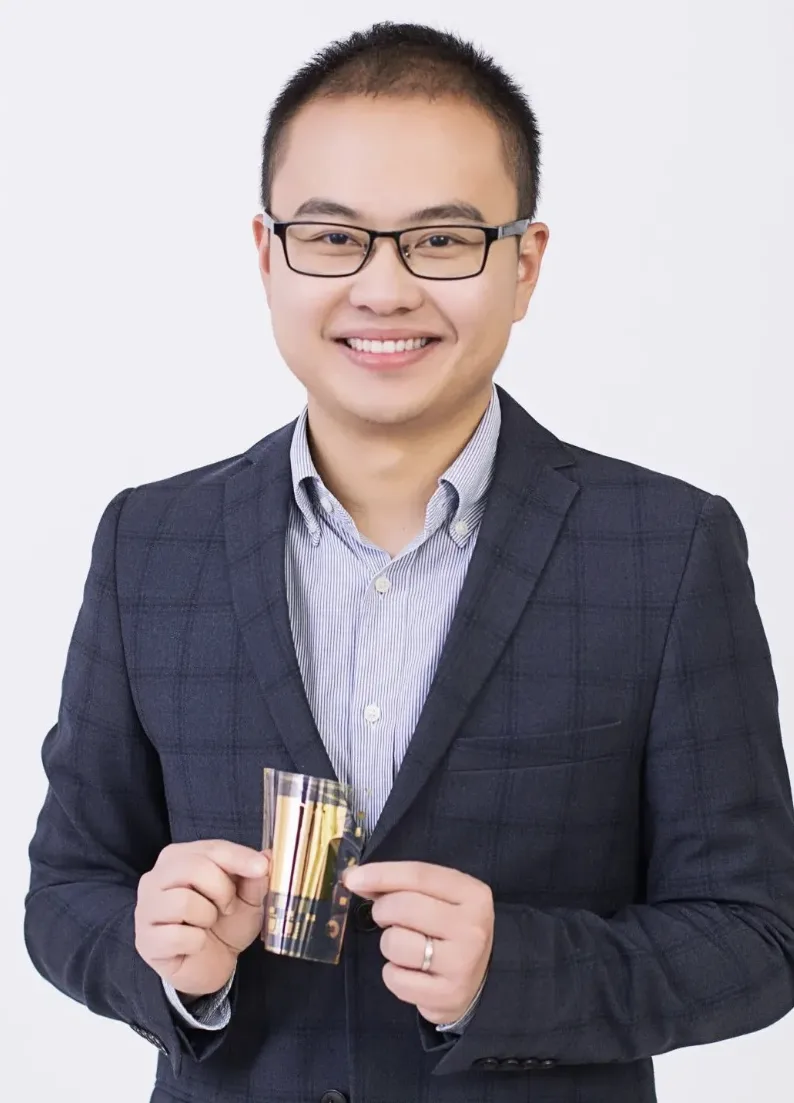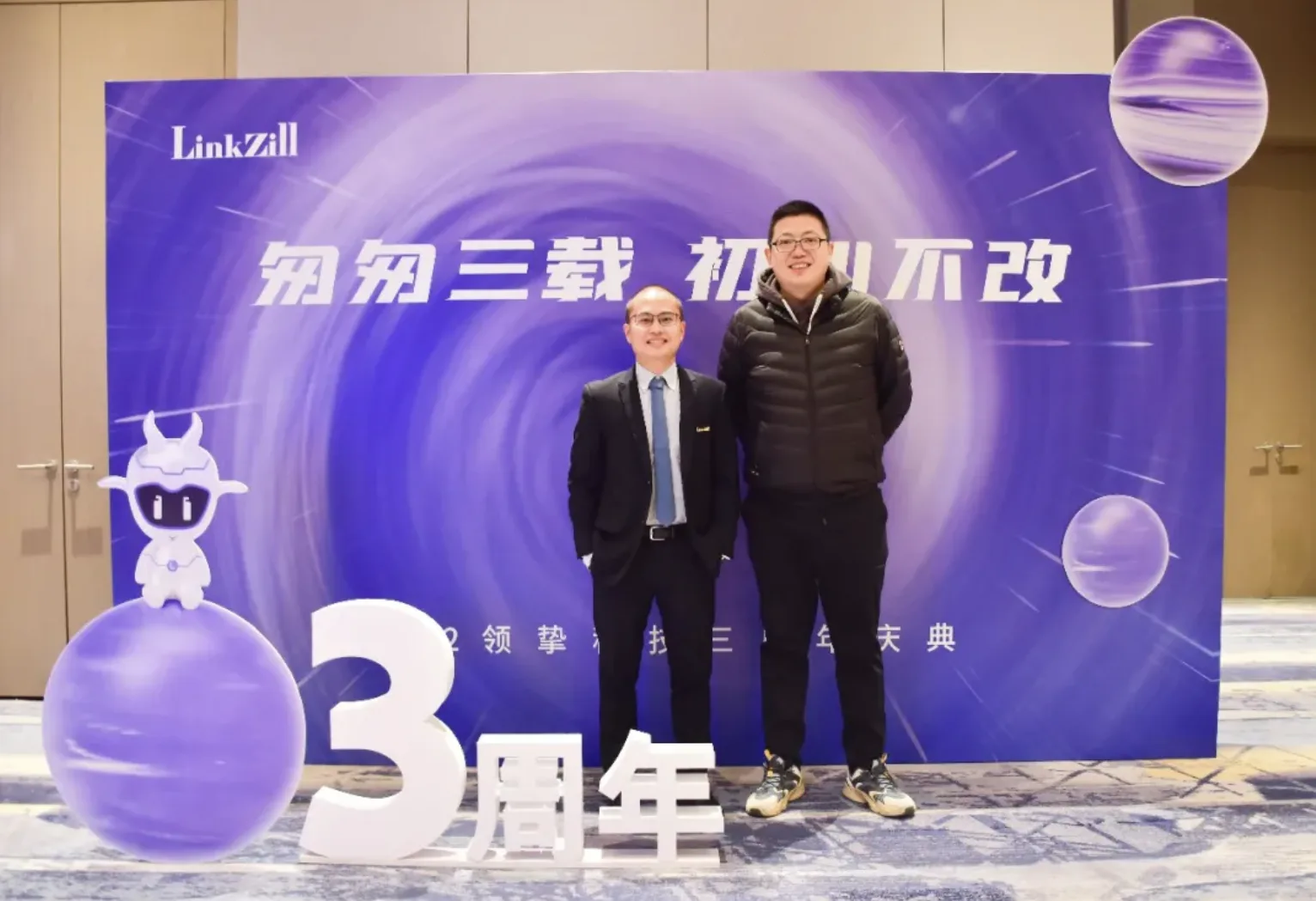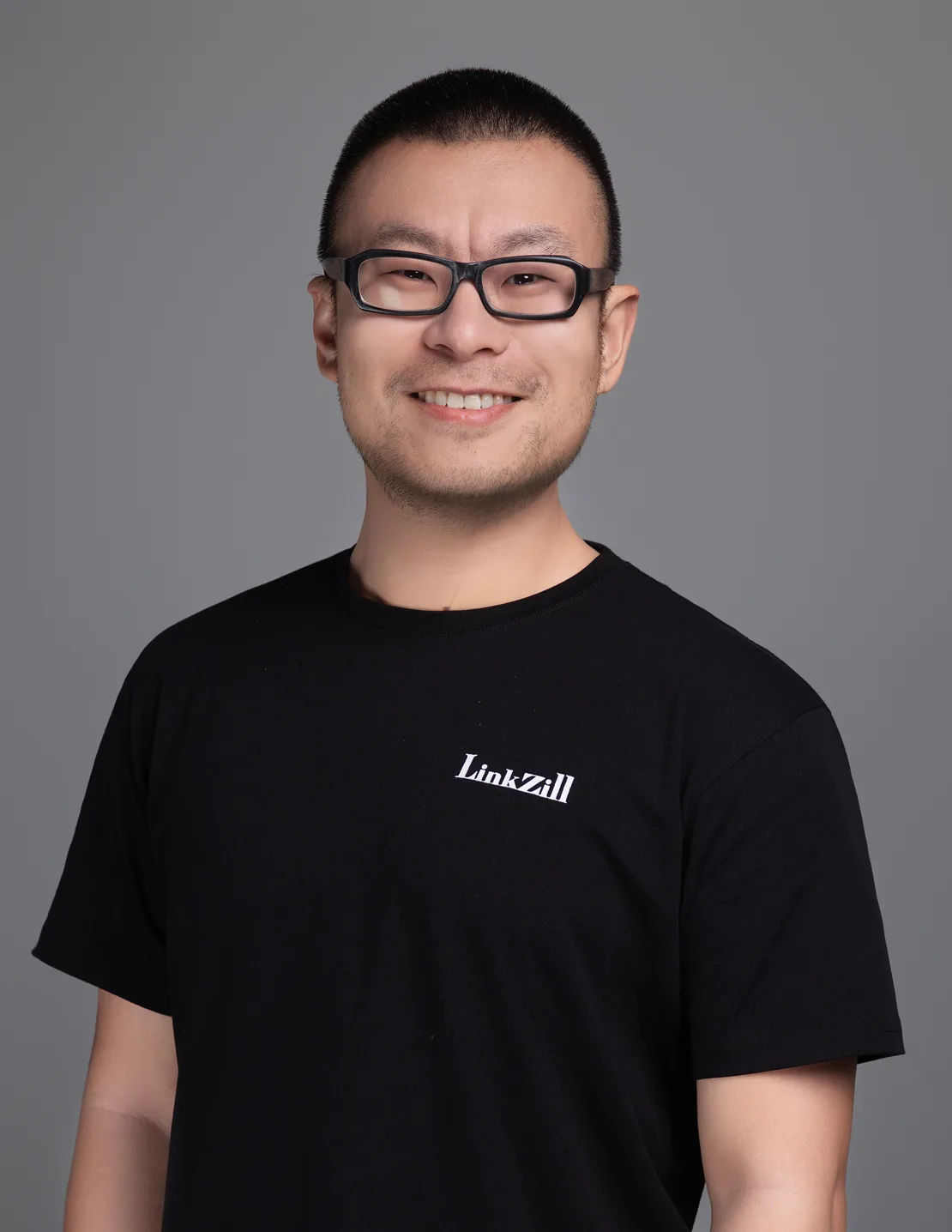Those who meet Dr. Linrun Feng, CEO of LinkZill Technology, for the first time are often surprised—he doesn’t quite fit the stereotype of a science and engineering PhD. Some partners have even joked, “Did he buy his PhD degree?”

Dr. Linrun Feng, CEO of LinkZill Technology, holding its core product—the TFT biochip.
From a personal background perspective, Linrun Feng is a standard “tech guy.” He graduated from Huanggang High School, completed his undergraduate studies at Huazhong University of Science and Technology, and then pursued a PhD at Shanghai Jiao Tong University’s School of Electronic Information and Electrical Engineering, earning his doctorate in June 2016. During his PhD, he spent a year as a visiting scholar at the University of Cambridge in the UK. Before returning to China to start his business, he worked for three years at a tech startup in the UK.
After embarking on his entrepreneurial journey, Linrun Feng developed a new hobby—chatting with other CEOs. He once tallied that in 2021 alone, he had 108 meetings, both hosting visitors and going out for learning exchanges.
Through these continuous interactions and conversations, many of these CEOs eventually became his partners.
Jun Zhang, founding partner of Dimension Capital, an early investor in LinkZill, describes Linrun Feng as not just a geeky tech guy obsessed only with technology or products, but rather a founder who can integrate ideas, bring teams together, and build strong relationships across the upstream and downstream business chains.

Left: Dr. Linrun Feng, CEO of LinkZill Technology; Right: Jun Zhang, Founding Partner of Dimension Capital
The “biochip” market where LinkZill and Linrun Feng operate is a field attracting global capital attention.
Not long ago (October 2021), at the finals of the 7th China International “Internet+” College Student Innovation and Entrepreneurship Competition, Linrun Feng led LinkZill to win a gold medal in the startup track on behalf of Shanghai Jiao Tong University.
Biochips are characterized by high throughput, electrical programmability, and the ability to conduct complex biological, chemical, and physical experiments on a chip the size of a postage stamp. Applications include but are not limited to DNA synthesis, single-cell manipulation, organ-on-a-chip, and brain-computer interfaces. The implementation of biochips provides underlying technical support for medical instruments and research equipment that are low-cost, require small samples, are time-efficient, and easy to operate.
In October 2021, LinkZill announced the completion of a $3.1 million Pre-A round of funding, led by ZhenFund with follow-on investment from Dimension Capital. The funds will be primarily used for TFT module laboratory construction, product R&D and scaling, market expansion, and company operations. LinkZill’s core product is the thin-film transistor (TFT) semiconductor biochip.
“After experiencing the darkness of 2020 and navigating gray areas, we did not fail to live up to that grace and favor and welcomed 2021,” Linrun Feng told “Xin Shang Yuan of Jiao Tong.” The focused field of TFT biochips, as a critical technological platform for multidisciplinary development, is gradually gaining attention from academia and industry, further driving breakthroughs in China’s high-tech sector.
“The TFT biochip market is far from its explosion point yet, but it has the potential to reach a market size of hundreds of billions of dollars in the future,” Linrun Feng stated.
Selling Shovels During a Gold Rush?
In 1998, academia proposed the concept of “lab-on-a-chip (LOC),” which integrates various biological and chemical analysis functions on a tiny chip, showcasing the promising future of biochip technology in clinical testing and precision medicine.
In recent years, developing “lab-on-a-chip” has evolved into an interdisciplinary field involving physics, microelectronics, materials, chemistry, biology, medicine, and more.
According to CCID data, the global biochip market reached 97.02 billion yuan in 2019. Research firm RESEARCH AND MARKETS predicts that the biochip market will grow at a CAGR of 15% from 2020 to 2025, approaching nearly 200 billion yuan by 2025.
In international markets, the primary customers for biochips are pharmaceutical companies and research institutions, with products focused on drug screening, genome sequencing, etc., such as those offered by Thermo Fisher and Agilent. LinkZill, however, focuses primarily on TFT chips. Compared to IC chips, TFT semiconductor biochips have the core advantage of China’s leading global production capacity, making them suitable for consumables and large-scale applications.
Linrun Feng noted that in the past, TFT was mainly used in display applications. As a fundamental semiconductor device, TFT can perform signal acquisition, conversion, processing, computation, and other general functions. In the future, the ubiquitous demand for detection/sensing/precise control in growing fields like healthcare, biological detection, and sensing will spawn numerous emerging scenarios where TFT can be applied.
“TFT chips are consumable chips with diverse applications,” Linrun Feng said. As TFT chips gradually gain industry acceptance, LinkZill’s revenue in 2021 grew by 150% compared to 2020.
Jun Zhang recalled that when he first encountered LinkZill, he decided to hold off investment because its products were only targeting research institutions. However, during the second encounter, LinkZill’s products had begun industrialization, with downstream customers like ACXEL starting to use them. Consequently, Zhang specifically took a risk and flew to Wuhan at the end of 2019 to finalize the angel investment in LinkZill and later made a follow-on investment in the Pre-A round.
“Angels don’t necessarily invest only when everyone understands, especially in cutting-edge technology,” Zhang stated. China has a globally leading TFT manufacturing foundation, with over 60% of the world’s TFT production capacity coming from China. LinkZill has the opportunity to participate in upgrading the TFT semiconductor industry, helping the trillion-yuan panel manufacturing sector transition from IDM to IDM + Foundry/Fabless models.
For LinkZill, when faced with the choice between “mining gold” or “selling shovels,” Linrun Feng’s choice is to “sell shovels.”
Linrun Feng mentioned that LinkZill’s upstream partners include industry giants in China’s panel sector, such as Tianma, while its downstream customers span the globe, comprising leading enterprises and cutting-edge research institutions in various segments of the life sciences field.
Currently, LinkZill has completed the development of its first batch of TFT chip products. Future efforts will focus on four major product lines: high-throughput DNA synthesis, active digital microfluidics, high-throughput biochemical/photoelectric sensing, and cutting-edge scientific research.
Three Near-Death Experiences
Linrun Feng stated that the booming life sciences application market and the gradual overflow of TFT production capacity present LinkZill with a rare historical opportunity and social mission. If it were too early, TFT capacity wouldn’t overflow; if too late, the opportunity would be lost.
In the TFT biochip field, though LinkZill is “small,” it is already a “pioneer” in this industry and holds an internationally leading position.
LinkZill focuses on TFT biosemiconductor chips, enabling upstream display panel companies to concentrate on TFT manufacturing while allowing numerous innovative enterprises and research institutions in the biological field to focus on the R&D, experimentation, and application of biotechnologies. This greatly enhances the efficiency of the entire TFT biosemiconductor industry chain.
LinkZill’s core product, the TFT chip
Despite the hardships of entrepreneurship, LinkZill, which now seems to be developing smoothly, nearly faced “death” three times.
The first time: After Linrun Feng returned to China, the initially agreed-upon investor signed the contract but never transferred the funds. The team almost failed before even starting, but thanks to their persistence, LinkZill was established.
The second time: The pandemic. During the pandemic, LinkZill’s entire company was in Wuhan. The company “groped in darkness for two years; panel manufacturers weren’t willing to cooperate with us then, and we ourselves didn’t know what to do.” Recalling the months trapped in Wuhan during the pandemic, Linrun Feng even feels somewhat ashamed—every day was just about scrambling for groceries and stewing free-range chicken soup, nothing else got done.
The third time: Mid-2021. At that time, the company’s funds were nearly depleted, and the prospects for TFT biochips were still unclear. Just as blood was about to run out, ZhenFund unexpectedly provided a timely transfusion in October of the same year at the fastest speed.
Despite three near-death experiences, the team remained unwavering and united. “LinkZill groped and waited in darkness for several years; it was truly pitch-black without a glimpse of light, finding joy amid hardship,” Linrun Feng said. Previously, LinkZill’s experience could be described as “painful yet joyful,” but the strategic goals for the next five years are now very clear: focus on high-throughput DNA synthesis, active digital microfluidics, high-throughput biochemical/photoelectric sensing, and cutting-edge scientific research.
It’s hard to imagine that Linrun Feng, whom investors describe as “excelling in both technology and business with high humanistic literacy,” scored extremely poorly in Chinese during the college entrance exam, completely unlike his performance in math and sciences. During the entrepreneurial process, however, Linrun Feng continuously evolved. He believes his strength lies in his extremely strong learning ability: “I have been iterating constantly, and this is also LinkZill’s way of survival and development.”
Linrun Feng revealed to “Xin Shang Yuan of Jiao Tong” that LinkZill has recently initiated its next round of financing.



